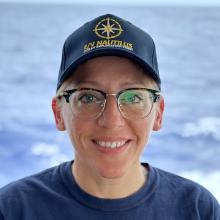
Sarah Sergent
Tell us about your work/research. What kinds of things do you do?
I work on maintaining and operating remotely operated vehicle (ROV) systems for research purposes. These are essentially huge robotic systems that we can dive into extremely deep areas with. They also have two robotic arms with claws on the front that we can use to collect samples or operate equipment with. I work alongside a team whose objective is to make sure these working-class ROV systems can complete research missions, whether the goal is to collect samples of rocks, coral, or sand, or operate the ROV to transport and deploy scientific equipment, I get to help make this possible. I really like being able to help scientists reach depths and explore new areas that have never been seen. I am newer in this field and get really excited to learn new things and systems. Somedays I get to make sure the ROV is "dive ready" by completing pre-dive checks and making sure everything is working how it should, deploying or recovering the ROV system, and even helping pilot it!
What sparked your initial interest in your career?
I grew up in a really small town in Michigan that was right on the water. I spent most of my free time out on the water, and was always curious about what exactly was beneath us. I also enjoyed helping my Dad in his garage while he worked on cars, and hoped to get a career in a field that allowed me to work on some sort of vehicle out on the water. When I was 18, I made my first trip to the Ocean (Atlantic) and I was hooked. I knew I wanted to be out on the ocean for my job.
Who influenced you or encouraged you the most?
It was my college instructors who led the Marine Technology Program who helped mentor, motivate, and support me in this field. They assured me that I would be capable of anything I set my mind to, and urged me to apply for any opportunity that we heard of. If I ever have a question or need advice, they are always available and enjoy talking about future possibilities. I would not be here if it weren't for them.
What element of your work/study do you think is the most fascinating?
The most fascinating thing I have experienced was last summer helping pilot a large rov system down 3,200 meters deep to collect samples from the ocean floor. I got to see the most incredible fish, coral, octopus, and so many more sea creatures that I had no idea even existed. Everything looked like it was from a cartoon! It was hard to believe it was real.
What other jobs led you to your current career?
Actually the last decade I worked as a health/recovery coach where I was able to help guide, mentor, motivate, and support individuals who were seeking recovery from mental health, physical health , or substance use struggles. I enjoyed working with people and helping them to better their lives and achieve life-long goals. It was always my hope to do what I am doing now, so a few years ago I went back to school to achieve my own dream of working out on the Oceans. And then last year I was selected to complete an internship, where I spent a couple of months on the Pacific Ocean helping science teams explore areas like the Blanco Fracture Zone and the ocean floor around Mount Axial, which is actually the most active volcano system in the Pacific Northwest! (It is just underwater) I loved every minute of it and cannot wait to get back out on the water.
What are your degrees and certifications?
I graduated from Northwestern Michigan College with my associate degree in the Marine Technology Program.
What are your hobbies?
I really enjoy anything that gets me outside. I really enjoy backpacking, running, spending as much time as I can with my dog Emma, hiking, fishing, hunting, and spending time with my family. I have 3 sisters and a lot of nieces and nephews, so anytime I can go visit, Emma and I pack up the car and take a road trip!
What advice would you give someone who wants to have a career like yours?
If you wanted to work with ROV systems, I would suggest taking some basic water studies classes and electronic classes. If there are Marine-Technology courses nearby, definitely enroll. Just start. It is amazing what people are capable of! I could not have dreamed to be at where I am today! Even if you think "There is no way I could do that, I have no clue what I am doing", I am here to tell you that it is possible! If you have a goal to work on research vessels and operate these amazing robotic systems, you can do it! You just have to put in some work. Even starting small, basic electronics or hydraulics classes, math classes, or robotics classes would help introduce those introductory skills. Once you start, you can also apply for internship opportunities where you can learn hands-on skills and gain at-sea experience like this.
How did you get involved with the Ocean Exploration Trust?
Last summer I worked with someone who told me about Ocean Exploration Trust and the amazing work they do. I also met a wonderful woman at the 2022 OCEANS Conference who told me about this opportunity. So I applied for the ROV Jr. Engineer/Co-Pilot Position.
Expeditions
Sarah participated in the following Ocean Exploration Trust expeditions:
